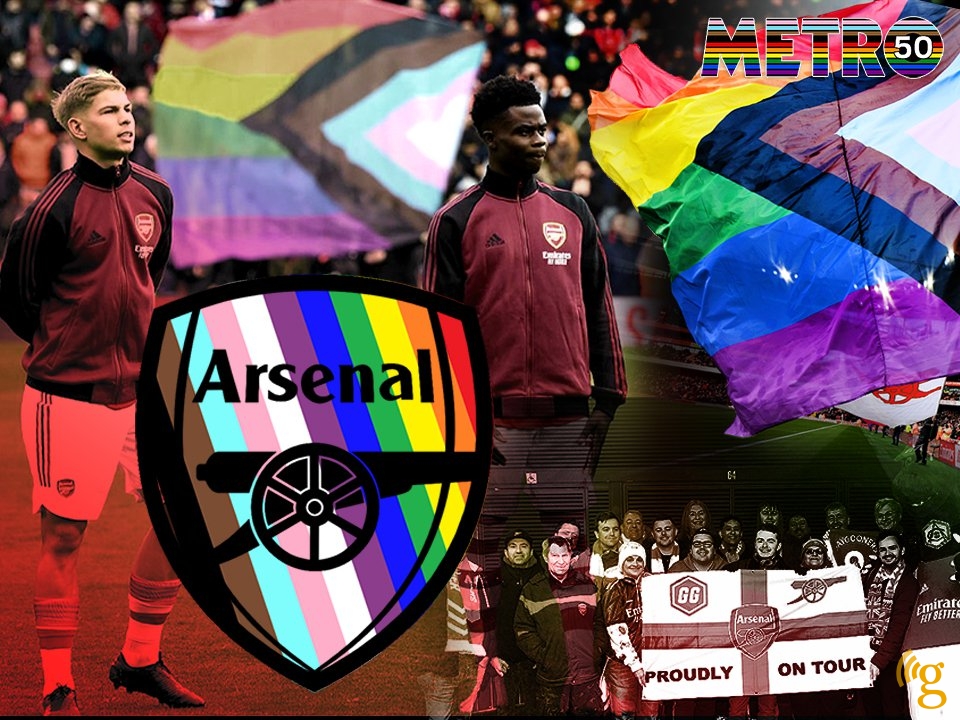
‘I don’t give a toss that you’re LGBT, you’re an fan and you hate Spurs!’
That is the resounding message from the co-chair of Gay Gooners, Arsenal’s official supporters’ group for LGBT+ fans, Carl Fearn, who wants all fans to be treated equally, no matter their sexuality or gender.
In an exclusive interview with Metro.co.uk for Pride Month, Fearn, who plays a key role in the first and largest LGBT+ fan group in England, tells a heartwarming anecdote about how his younger brother accepted him for who he was, without hesitation or judgement.
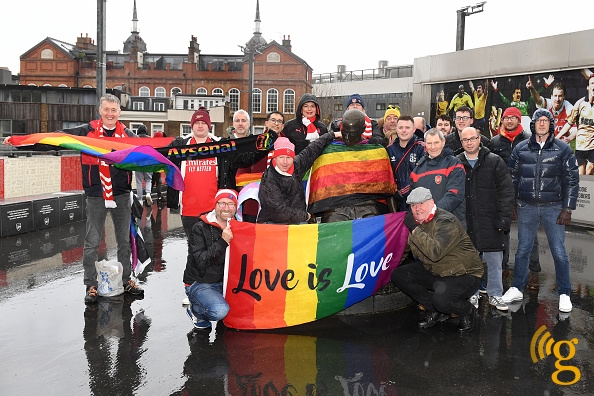
‘I was married for 12 years before I came out,’ says Fearn. ‘When I came out to my younger brother, who I’d shared a bedroom with and had to tolerate all his mates calling me a poof and a fairy way back, his final comment was, “You’re still my brother aren’t you!”.
‘I said, “Unfortunately for you, I’ll always be your brother and you’ll always be mine”, and he went, “Well I still love you then”. That was the only time in his 54 years on the planet he ever told me that he loved me. After that, I thought I don’t care what anyone else says, because my younger brother will be looking out for me and standing up for me. That filters into what the Gay Gooners are all about at heart.’
It’s been a year of evolution for Arsenal on the pitch, with the youngest manager in the league, Mikel Arteta, leading the youngest team in the Premier League to within an inch of the top four and a return to Champions League football.
Unity has been the buzzword surrounding the Gunners’ recent rise, following a dismal past few years full of resentment between fans regarding footballing matters.
While a youthful squad full of academy graduates, coupled with work in the community with local businesses, has helped rebuild the broken connection between the club and its fanbase, the supporters are uniting in another sense.
Gay Gooners, who have garnered over 1,100 members in all seven continents since the group’s inception in 2013, are helping to create a safer environment for LGBT+ fans.
It’s a social group for LGBT+ Arsenal supporters and their friends to provide a safe space in which they can meet up, share tickets, organise trips to away games and campaign to rid football of the scourges that are homophobia, biphobia and transphobia.
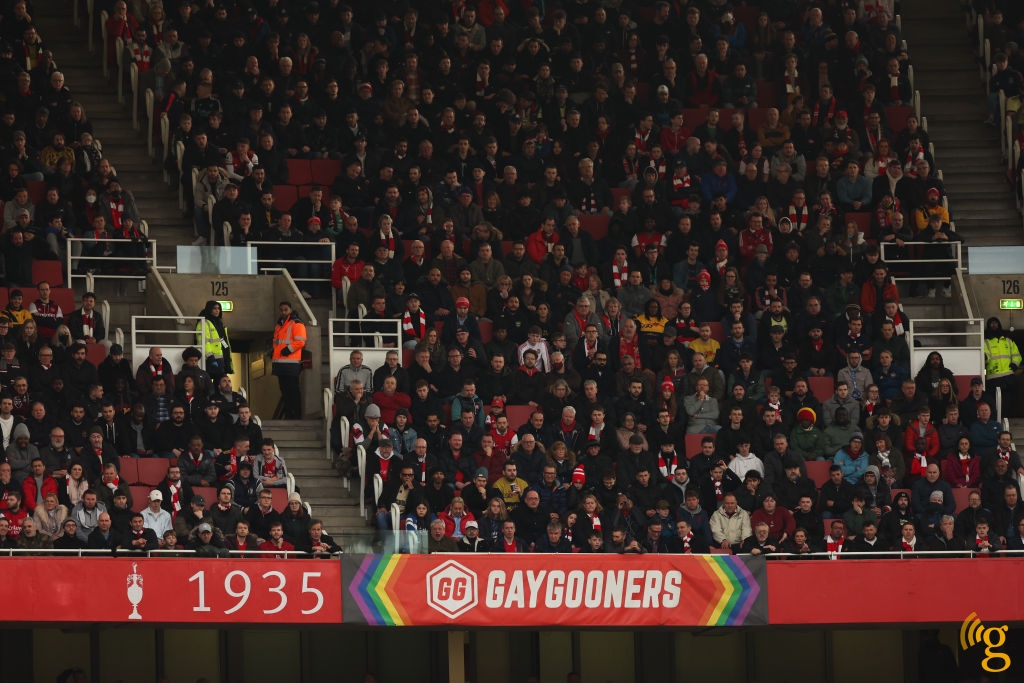
What’s so special about the group is how it has been embraced by Arsenal. The north London club display the Gay Gooners banner at the Emirates Stadium and invite members to take part in inclusion training for staff, while the group represent the Gunners at the annual London Pride parade.
Fearn describes Arsenal as ‘trailblazers’ and hopes the intentions of other clubs who have since followed in the north Londoners’ footsteps are as sincere and genuine.
When asked whether attitudes towards LGBT+ fans are improving, Fearn replies: ‘Definitely, and groups like ours have helped amplify the situation.
‘The fact that every Premier League club now has an LGBT+ supporters’ group shows the clubs are embracing this. I hope that they are doing it for the right reasons and not because they’ve got to tick the diversity box in the corporate handbook.
‘I can’t speak for other groups, what I can say for Arsenal is I genuinely feel they do embrace us as an important section of their fanbase. The support we’ve had from them over the last 10 years has been above and beyond. They’ve always been trailblazers for everybody else to say this is the standard you have to aim towards. By their own admission, the club and us will say we’re a little way off in terms of the education and visibility that’s required.’
There is plenty of work still to be done though, with plenty of incidents of abuse from the crowds still occurring in England’s top flight.
Arsenal are investigating homophobic abuse from fans during a Premier League clash against Brighton in April, where two supporters were ejected from the Emirates Stadium.
In the last week of the 2021/22 campaign, Gay Gooners noted three incidents involving transphobia and homophobia directed towards members of the group.
‘In certain sections of fan support, there’s this minority that cling to the fact that it’s just banter. It’s not banter,’ says Fern. ‘There’s a bit of a herd mentality of joining in with the chants and not fully realising the implications and how somebody next to them might feel about it. There’s still an underlying issue, it’s definitely got better, but it’s still a problem.
‘In the last week of the season, we as a group had three cases of transphobia and homophobia against our members of which I was one. I was called out for wearing rainbows laces at the Newcastle game. A group of teenage lads thought they would throw homophobic abuse at me. I rather cheekily said, “You have no idea who I am. I think I’ll give that guy at Sky Sports News a call now, it might be a good time”. As soon they heard this they scarpered.
‘Unfortunately for other members, it was transphobic comments. On two occasions after the game, aimed at the same person, there was almost an organised chant because she said there was a tune to it. It was like, “Are you a man or a woman”, and it was a group of 10-12 lads shouting this at her… all because of how she was presenting herself at the game.’
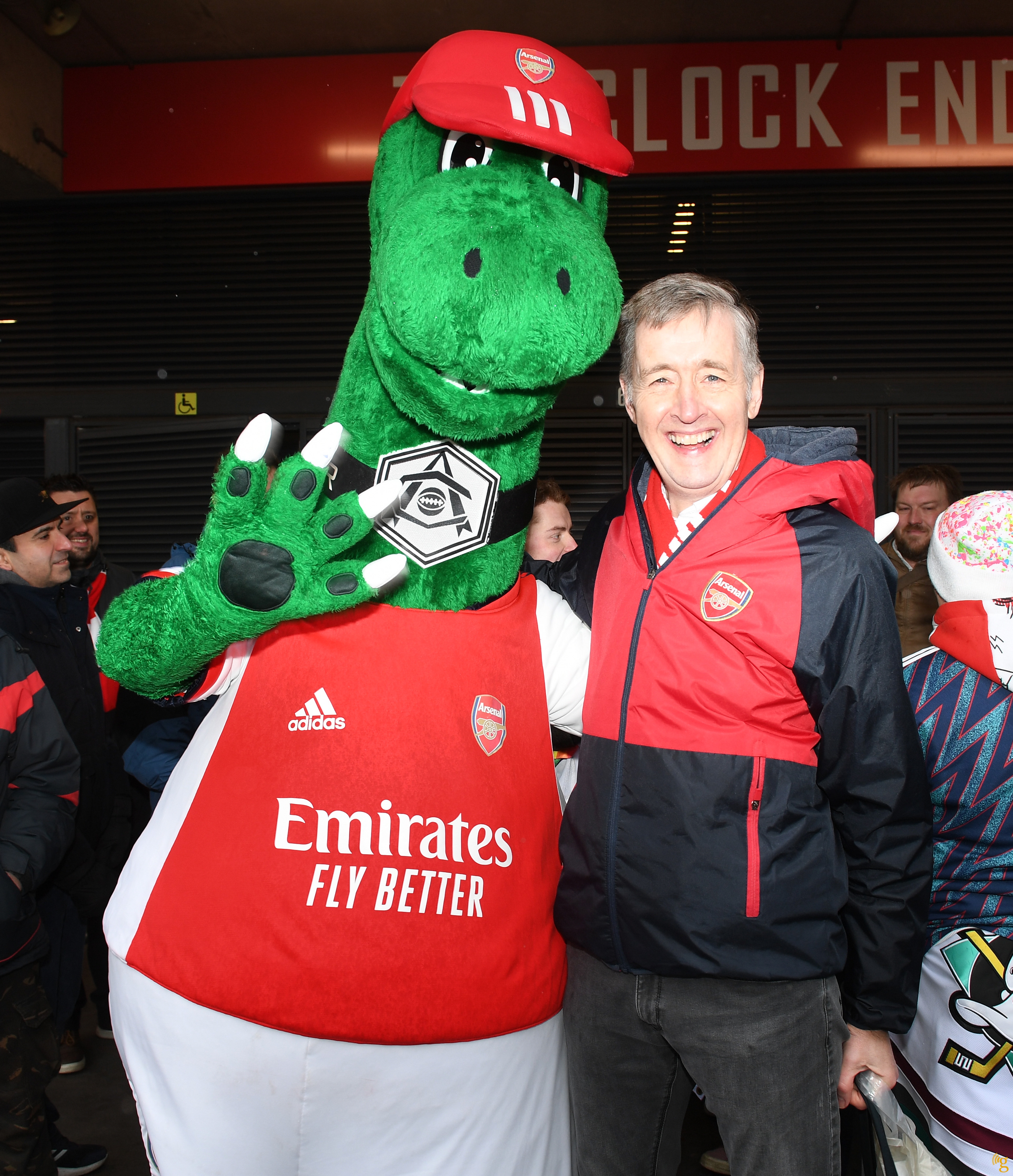
Fearn confronts homophobic abusers in his own diplomatic way, despite standing at over 6’4″ in stature, and recalls a particularly fond scenario in which an abuser turned into an ally. He reinforces the point that allies are vital, revealing that around 10 per cent of Gay Gooners members identify as straight, but are nonetheless vital in supporting the group and speaking out against discrimination.
‘The most infamous one was in Baku for the Europa League final,’ he says. ‘We met up in a bar and I was so excited because I had a flag made for the game which had the Gay Gooners logo on and at the bottom: “Proudly on tour”. That’s as much as I dared in Azerbaijan. I got the flag out at the pub and was showing my mates. In the background there were lads sitting in the bar and they were singing the Ashley Cole chant – one that we really do not like.
‘I couldn’t help myself I went up – there was about 12 of them – I said, “Gentleman, we have better chants than this”. This is in Azerbaijan, which is ranked 47th out of 47 countries for LGBT rights in Europe, where I’m at possible risk of being abused by security forces. I said, “I’m a member of the Gay Gooners and this is the sort of chant that we’d like to have retired”. Some of the lads apologised, but one guy just went off the deep end, I couldn’t believe the kind of things he was saying to me – shouting at me. Some other lads dragged him out of the bar.
‘The next day, we went to the fan zone. I did an interview with someone from Ukrainian television. While I’m being interviewed by him, one of the guys that had been in the bar the night before walked past and in the middle of the interview, shouted, “Up your arse”. Obviously it was being said homophobically. Afterwards, I said to him, “What’s your problem after what happened in the bar, I was representing Arsenal. I’m not exposing who I am in this place, but you saying stuff like that is putting me at risk”. He apologised saying I don’t know what came over me and I’ll look at it in a different way now. We ended up shaking hands.
‘A few months later I’m at an away game and I bump into him. He comes up to me and says how are you, did you get back safely. We now end up hugging each other when we go to games and we help each other get tickets. So he’d become an ally. If you work at it, people understand where you’re coming from.’
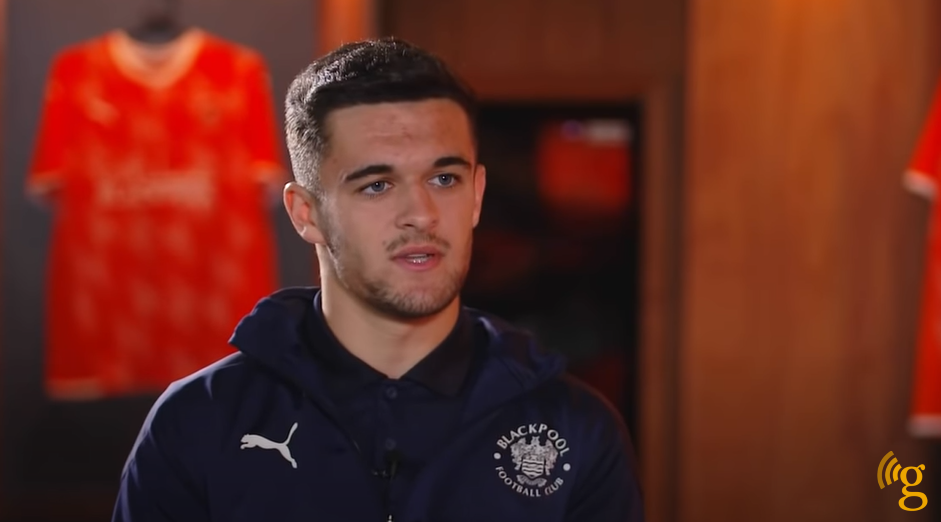
In May, Blackpool striker Jake Daniels became the first male professional player in English football to come out as gay since Justin Fashanu in 1990.
The 17-year-old’s bravery was lauded by the footballing world, but with 34 per cent of people aged 16-22 in the United Kingdom not defining themselves as exclusively heterosexual, according to a 2017 survey from the BBC and Ipsos Mori, why aren’t more footballers coming out?
Patrice Evra recently opened up on the homophobic views aired by some of his former West Ham team-mates, claiming they would call for a gay player to leave the club and refuse to share a post-match shower room with them.
Fearn feels footballing authorities such as the FA, FIFA and UEFA are somewhat complicit in that gay footballers are underrepresented in positions of power.
‘It kind of surprised and didn’t surprise me,’ says Fearn on Evra’s claims. ‘They bring up this issue of showering with gay people and it’s like, “Don’t flatter yourself a gay man doesn’t automatically think every man on the planet is God’s gift”. It defies logic. It’s just ignorance, a stereotype perpetuated that gay men are a threat in the changing room when they’re absolutely not.
‘It’s a combination of factors [why players are hesitant to come out], what I would say first and foremost is we as a group would never push anyone to come out. Coming out is a personal thing.
JAKE DANIELS' MESSAGE TO BLACKPOOL FANS
This season has been a fantastic one for me on the pitch. I’ve made my first-team debut, scored 30 goals for the youth team, signed my first professional contract and shared success with my team-mates, going on a great run in the FA Youth Cup and lifting the Lancashire FA Pro-Youth Cup.
But off the pitch I’ve been hiding the real me and who I really am. I’ve known my whole life that I’m gay, and I now feel that I’m ready to come out and be myself.
It’s a step into the unknown being one of the first footballers in this country to reveal my sexuality, but I’ve been inspired by Josh Cavallo, Matt Morton and athletes from other sports, like Tom Daley, to have the courage and determination to drive change.
In reaching this point, I’ve had some of the best support and advice from my family, my Club, my agent and Stonewall, who have all been incredibly pro-active in putting my interests and welfare first. I have also confided in my team-mates in the youth team here at Blackpool, and they too have embraced the news and supported my decision to open up and tell people.
I’ve hated lying my whole life and feeling the need to change to fit in. I want to be a role model myself by doing this.
There are people out there in the same space as me that may not feel comfortable revealing their sexuality. I just want to tell them that you don’t have to change who you are, or how you should be, just to fit in.
You being you, and being happy, is what matters most.
Jake
‘However, we are aware of the fact that there is pressure. This is my personal view – one of the issues is the Premier League is one of the most international leagues in the world in terms of player-country representation. I think there is pressure from agents and maybe some star players to not embrace “we respect everybody”, they’ll keep quiet about it but behind the scenes there would be a sort of pressure. If you’re from a certain country playing for a certain large football club and one of the players came out, the backlash that you might get even though you’re not the gay player might be as bad as what a gay player might get anyway. A sort of dreaded guilt by association. I think that drives some it.
‘I can see the impact of UEFA and FIFA, what we saw at the Euros in Hungary when rainbow flags were taken away by security people and they wouldn’t allow the Munich stadium to be lit up in a rainbow.
‘UEFA and FIFA are a little bit complicit in this if I’m honest. The authorities don’t help, there’s a lot of lip service but not a lot of action. You only have to look at the make up of the FA, UEFA, FIFA – the men in suits as I call them. Where is the openly gay or bisexual or lesbian person in FIFA, UEFA or the FA?’
Ultimately, being able to watch football without judgement or harassment is the main aim for the Gay Gooners.
‘At the end of the day, we’re Arsenal fans,’ Fearn concludes. ‘Every family’s got different members, we’re different colours, religions. It doesn’t matter. All we’re asking for is the same respect other people have for each other. No matter who we are, respect us.’
, .
, and .
Metro.co.uk celebrates 50 years of Pride
This year marks 50 years of Pride, so it seems only fitting that goes above and beyond in our ongoing support, through a wealth of content that not only celebrates all things Pride, but also share stories, take time to reflect and raises awareness for the community this Pride Month.
MORE:
And we’ve got some great names on board to help us, too. From a list of famous guest editors taking over the site for a week that includes Rob Rinder, Nicola Adams, Peter Tatchell, Kimberly Hart-Simpson, John Whaite, Anna Richardson and Dr Ranj, we’ll also have the likes Sir Ian McKellen and Drag Race stars The Vivienne, Lawrence Chaney and Tia Kofi offering their insights.
During Pride Month, which runs from 1 - 30 June, Metro.co.uk will also be supporting , a Ukrainian charity forced to work harder than ever to protect the rights of the LGBTQ+ community during times of conflict. To find out more about their work, and what you can do to support them, click .

























